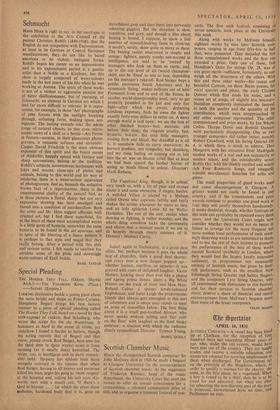Scottish Chamber Music
WHEN the distinguished SCottish composer Sir John McEwen died in 1948 he made a bequest to Glasgow University for the encouragement of Scottish chamber music. At the suggestion of Frederick Rimmer, head of the music department, the University Court has used the money to offer an annual commission for a composition, a triennial composition prize of £60, and to organise a triennial festival of con-
certs. The first such festival, consisting of seven concerts, took place at the University this week.
Along with works by McEwen himself, eighteen works by nine later Scottish con• posers, ranging in age from fifty-five to half that, were presented. They included the first three commissioned works and the first one awarded a prize. Only one of these, lain Hamilton's Octet for strings Op. 28, was of any great merit—sufficient, fortunately, to ou • weigh all the dreariness of the others. With this and three other works—his recent and beautiful Cantata, on three Burns poems, for vocal quartet, and piano, the early Clarinet Quintet which first made his name, and a recent set of songs, of slightly less interest Hamilton completely dominated the festival, in both the quality and the quantity of li contribution, which were unapproached by any other composer represented. The other commissioned and prize works, by Ian Whyte, Cedric Thorpe Davie and Ronald Duncan, were particularly disappointing. One or two younger composers did rather better, notably Robert Crawford, with his String Quartet 01. 4, in which there is much to admire, Thca Musgrave with her attractive Four Madrigals, modest works of a real and not necessarily so modest talent, and the considerably senior Robin Orr, with his thickly curdled and sourly rich Four Romantic Songs, and vinegarily eclectic neo-classical Sonatina for cello and piano. The small proportion of good works need not cause discouragement in Glasgow. A greater would not easily be found in any country, and if the scommissions and prize awards continue to produce one good work in four they will justify themselves handsome': - It seems doubtful, though, whether festivals on this scale can profitably be repeated every three years, and the University Court might now consider whether they would not do better In future to arrange for the more frequent but more modest local performance of such seem' ingly deserving works as are submitted to them, and to use the rest of their income to promote the performance of the best of these works outside Scotland (probably in London, where they would find the largest keenly interested audience), in programmes not necessarily entirely of Scottish music, but given by Scot' tish performers, such as the excellent NeW Edinburgh String Quartet and Saltirc Singer', and the competent Lyra String Quartet, who all contributed with distinction to this festival, and for their services to Scottish chamber music deserve a share of financial and moral encouragement from McEwen's bequest more than some of the lesser composers.










































 Previous page
Previous page